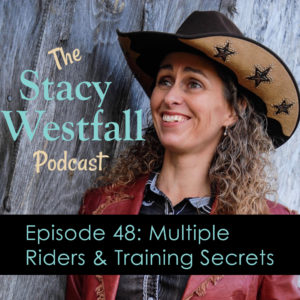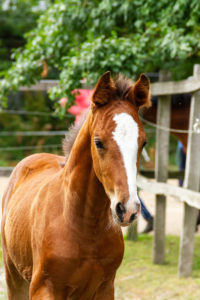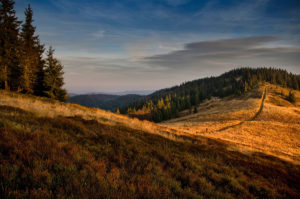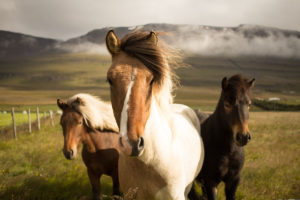Episode 48: Q&A: Are multiple riders good or bad? Training Secrets?

One of the things I do on this podcast is answer listener questions. If you have a question you would like to ask or have a topic you would like to hear more about, go to my website and click on the orange tab to the right to leave a voice message. My first question is from a listener who wants to know if there are different techniques that the professionals in the western world use when showing their horses that people at home may not know about.
I answer this question by using an example of three different trainers, and I share how the horse world is a lot like life, and we see different trainers doing different things. I share why it’s really important to understand who you want to be and where you draw the line. I put educating the horse above winning the show. I also answer another listener question about horses having multiple riders.
This one is a two-part question and revolves around whether it’s good for a horse to have multiple riders and how to make sure the riders aren’t doing any damage to the horse. This is a great question, and the answer revolves around the horses level of confidence, grandma’s rules, and their level of training such as elementary school, high school or college. I recently returned from a show with Gabby and Willow, and I’ve been in a reflective mood, so these questions are timed perfectly.
“I prefer a long slow process. At the end, I know what I want for my horses.” Stacy Westfall Click To TweetShow Notes:
[01:06] The first question is from Jamie. She is wondering if there are different techniques that the Professionals in the western world use when showing their horses that people at home may not know about.
[03:12] I just returned from the Western Dressage Show with Gabby and Willow, and I’m still reflecting and processing on everything that I did leading up to the show.
[03:49] People have different training theories. So I’m going to give examples as if there are three different trainers.
[04:11] Trainer one is willing to do anything to win. This isn’t the majority of the show world, but it’s out there. Trailer number two wants the best for the horse and the best for the customer. They work really hard to communicate and bring out the best in the horse and the rider.
[05:01] Trainer number three has been training for decades. They might be a little bit burned out.
[05:47] You are going to see different trainers doing different things, and that’s just a part of life.

[06:22] You have to pick which trainer you want to be. I would never be that trainer who does anything to win or does anything unethical.
[07:39] I’ve used ear plugs with my horses during mounted shooting because of the physical damage that could be done to their hearing. I also used your plugs on myself, because I was shooting blanks out of my guns.
[08:44] Some trainers could use earplugs when there’s loud clapping for a mental advantage, but taking the long way around would be a better approach.
[09:52] At home, you’re going to have to weigh out what you believe in and what you’re going to stand for and do.
[14:58] There are also rules for different shows about things like earplugs.

[17:14] The horse industry is a reflection of life whether you are training or showing.
[17:53] You’ll see a lot of trainers doing a lot of different things to get a lot of different results. Break those into categories and see if it fits with what you would want to do with your horse.
[18:07] The next listener has a two-part question about multiple people riding a single horse. Is it good for a horse to have multiple Riders? How do you make sure novice riders aren’t doing any damage to the horse?
[19:21] It’s good for riders to ride different horses to gain experience.
[19:31] There are multiple layers to the question of whether it’s good for a horse to have multiple riders.
[19:49] When a horse is in elementary school, I would like to see a lot of consistency with who rides the horse. The horse is impressionable at this stage.

[20:21] When the horse is in high school and college level, they are able to switch gears faster. Now it tends to be less confusing for the horse.
[21:02] Advanced horses don’t experiment with Grandma’s rules, because when they were trained all the rules were the same.
[22:25] One of my biggest training philosophies is to prevent problems as long as possible.
[23:37] It really matters who gets on your horse.
[25:03] I keep my horses protected in shelter during the elementary school years, and then open up a little more during the high school years. By college I get them really comfortable with different riders.
[27:52] If it scares the horse, it falls into the category of damage being done and shaken confidence.
“I encourage people who are learning and asking questions to find someone whose mental process they can follow from beginning to end.” Stacy Westfall Click To Tweet
Links and Resources:
The trail to the World Show Episode 1: Meet the Horses & Goal Setting
Stacy’s Video Diary: Jac-Episode 1-First Day-Part 1-Evaluating Jac
Stacy’s Video Diary Jac-Episode 34-How a horse responds to a new rider
Episode 47: Locking and Unlocking Traits in Your Horse
Have you ever wondered what a live version of this podcast would be like?I’m hosting some live, online video calls that are like a live version of this podcast. I teach on a subject, answer questions and for those who are brave, I’ll turn your video on live too and you can join me for a conversation!
If you want to learn more about this you can visit https://stacywestfall.com/live/ for more information!
SUBSCRIBE TO THE PODCAST HERE:





YOURS FREE
WHY IS MY HORSE...?



